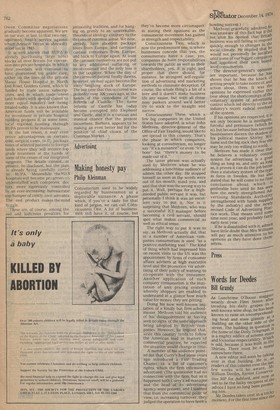Advertising
Making honesty pay
Philip Kleinman
Consumerism used to be widely regarded by businessmen as a deplorable nuisance. A phase which, if you've a taste for that kind of jargon, we can call Consciousness One. A lot of businessmen still have it, of course, but they've become more circumspect in stating their opinions as the consumerist movement has gained in strength and respectability.
Consciousness Two, which is now the predominant one, is where businesses concede that yes, the consumerists have a case; yes, companies do have responsibilities 'towards the public as well as their shareholders; yes, it is right and proper that there should, for • instance, be stringent self-regulation of advertising and marketing methods to eliminate deception. Of course, the whole thing's a bit of a bore and it doesn't make business life any easier, but with all those nosy parkers around we'd better try to stick to the straight and narrow.
Consciousness Three, which a few big companies in the United States have adopted, is what John Methven, director-general of the Office of Fair Trading, would like to see spread to this country. That's the phase in which companies, looking at consumerism, no longer say "it's a nuisance" or even "it's a bore" but "there's money to be made out of it."
The latter phrase was actually used by Methven when he Was addressing a lunchtime audience of admen the other day. He stopped himself as soon as the words were out of his mouth, mind you, and said that that was the wrong way to put it. Well, perhaps for a highminded public servant it was, but personally I think it was an excellent way to put it. Nor is it surprising that Methven, who was a successful ICI manager before becoming a civil servant, should spot what makes commercial as well as ethical sense.
The right way to put it was to say, as Methven actually did, that in a number of American companies consumerism is used "as a positive marketing tool." The kind of thing which had impressed him on recent visits to the US was the appointment by firms of consumer affairs advisers at high executive level and the promotion via advertising of their policy of Wanting to co-operate with the consumer. Another application of such company consumerism is the institution of unit pricing systems whereby shoppers are enabled to understand at a glance how much value for money they are getting.
Doing his now well-known imitation of a kindly but firm schoolmaster, Methven told his audience of his disappointment at having seen no signs of the same approach being adopted by British companies. However, he implied that, since this country tends to follow the American lead in matters of commercial practice, he expected the situation would change in time.
A member of his audience pointed out that Curry's had some years ago introduced a Fair Trading Charter, i.e. a list of customer's rights, which the firm extensively advertised. (The questioner had no connection with the firm, but as it happened both Curry's ad manager and the head of its advertising agency were present, and I learned that from the commercial point of view, i.e. increasing turnover, they judged the operation to have been a
Methven gracefully admitted he was unaware of this fact but it did not alter his opinion that British business was still failing to respond quickly enough to changes in the social climate. He implied that he would not personally be satisfied until some of our bigger companies level caoppnsoninmteedristtsh.eir own board The director-general's opinions are important, because he has shown that he has the knack of getting people to take notice of, and action about, them. It was the opinions he expressed earlier this Year about the shortcomings of the voluntary System of advertising control which led directly to the ad of hdtusetrsyys'stermecent radical overhaul If his opinions are respected, it is not only because he is intelligent, forceful and persuasive (which he is), but because behind him nervous his political discern r the shadowWil liams liams and the big stick they fear she may be only too willing to wield. sMteenithlieven has made it clear that system he for advertisingadavevrotilusinntgary is acognotrodol thing as long as, and only as long as, it proves it can do the job better than a statutory system of the type in force in Sweden. He has also stated that he will come to no fina, conclusion about which Is preferable here until he has seen how the newly strengthened Advertising Standards Authority (strengthened with funds supOlied by the industry) and the newlY revised Code of Advertising Practice work. That means until some time next year, and probably faitlY early next year. If he is dissatisifed with it, admen have little doubt that Mrs Williams will pay as much attention to his opinions as they have done thern* selves.
howling success.)




















 Previous page
Previous page